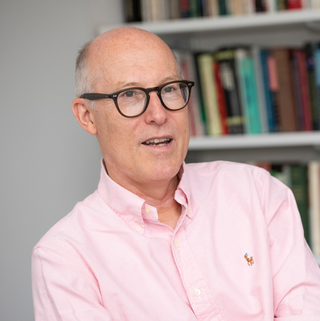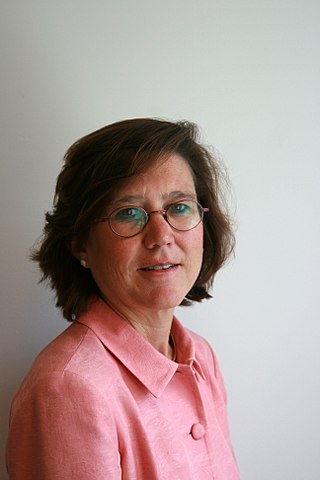Quality of life (QOL) is defined by the World Health Organization as "an individual's perception of their position in life in the context of the culture and value systems in which they live and in relation to their goals, expectations, standards and concerns".

Gross National Happiness, sometimes called Gross Domestic Happiness (GDH), is a philosophy that guides the government of Bhutan. It includes an index which is used to measure the collective happiness and well-being of a population. Gross National Happiness Index is instituted as the goal of the government of Bhutan in the Constitution of Bhutan, enacted on 18 July 2008.
The Canadian Institute for Advanced Research (CIFAR) is a Canadian-based global research organization that brings together teams of top researchers from around the world to address important and complex questions. It was founded in 1982 and is supported by individuals, foundations and corporations, as well as funding from the Government of Canada and the provinces of Alberta and Quebec.

Sir Timothy John Besley, is a British academic economist who is the School Professor of Economics and Political Science and Sir W. Arthur Lewis Professor of Development Economics at the London School of Economics (LSE).
The economics of happiness or happiness economics is the theoretical, qualitative and quantitative study of happiness and quality of life, including positive and negative affects, well-being, life satisfaction and related concepts – typically tying economics more closely than usual with other social sciences, like sociology and psychology, as well as physical health. It typically treats subjective happiness-related measures, as well as more objective quality of life indices, rather than wealth, income or profit, as something to be maximized.
The Easterlin paradox is a finding in happiness economics formulated in 1974 by Richard Easterlin, then professor of economics at the University of Pennsylvania, and the first economist to study happiness data. The paradox states that at a point in time happiness varies directly with income both among and within nations, but over time happiness does not trend upward as income continues to grow: while people on higher incomes are typically happier than their lower-income counterparts at a given point in time, higher incomes don't produce greater happiness over time. One explanation is that my happiness depends on a comparison between my income and my perceptions of the average standard of living. If everyone's income increases, my increased income gives a short boost to my happiness, since I do not realize that the average standard of living has gone up. Some time later, I realize that the average standard of living has also gone up, so the happiness boost produced by my increased income disappears. It is the contradiction between the point-of-time and time series findings that is the root of the paradox: while there is a correlation at a fixed point, there is no trend over multiple points. That is, in the short run, everyone perceives increases in income to be correlated with happiness and tries to increase their incomes. However, in the long run, this proves to be an illusion, since everyone's efforts to raise standards of living lead to increasing averages, leaving everyone in the same place in terms of relative income. Various theories have been advanced to explain the Paradox, but the Paradox itself is solely an empirical generalization. The existence of the paradox has been strongly disputed by other researchers.
Lars Osberg has been a member of the Economics Department at Dalhousie University since 1977. He also worked for a brief period at the University of Western Ontario. He is well known internationally for his contributions in the field of economics. His major research interests are the measurement and determinants of inequality, social exclusion and poverty, measurement of economic well-being, leisure co-ordination and economic well-being, time use and economic development, economic insecurity.
Edward Francis Diener was an American psychologist and author. Diener was a professor of psychology at the University of Utah and the University of Virginia, and Joseph R. Smiley Distinguished Professor Emeritus at the University of Illinois, as well as a senior scientist for the Gallup Organization. He is noted for his research over the past thirty years on happiness, including work on temperament and personality influences on well-being, theories of well-being, income and well-being, cultural influences on well-being, and the measurement of well-being. As shown on Google Scholar as of April 2021, Diener's publications have been cited over 257,000 times.

Carol Graham is the Leo Pasvolsky Senior Fellow at the Brookings Institution, a College Park professor at the School of Public Policy at the University of Maryland, a research fellow at the Institute for the Study of Labor (IZA), and the author of numerous books, papers and edited volume chapters.
Ruut Veenhoven is a Dutch sociologist and a pioneer on the scientific study of happiness, in the sense of subjective enjoyment of life. His work on the social conditions for human happiness at Erasmus University Rotterdam in the Netherlands has contributed to a renewed interest in happiness as an aim for public policy. He has shown that happiness can be used a reliable measure to assess progress in societies which was one of the sources of inspiration for the United Nations to adopt happiness measures as a holistic approach to development. Veenhoven is the founding director of the World Database of Happiness and a founding editor of the Journal of Happiness Studies. He has been described as "the godfather of happiness studies", and "a leading authority on worldwide levels of happiness from country to country", whose work "earned him international acclaim".
The Vancouver School of Economics is a school of the University of British Columbia located in Vancouver, BC, Canada. The school ranks as one of the top 25 in the world and top in Canada. The school exhibits research activity and offers undergraduate and graduate degrees.
The Behavioural Insights Team (BIT), also known unofficially as the "Nudge Unit", is a UK-based global social purpose organisation that generates and applies behavioural insights to inform policy and improve public services, following nudge theory. Using social engineering, as well as techniques in psychology, behavioral economics, and marketing, the purpose of the organisation is to influence public thinking and decision making in order to improve compliance with government policy and thereby decrease social and government costs related to inaction and poor compliance with policy and regulation. The Behavioural Insights Team has been headed by British psychologist David Halpern since its formation.

The World Happiness Report is a report by the United Nations that measures national happiness. Data is primarily from the Gallup World Poll nad based on respondent ratings of their own lives.
Med Jones is an American economist. He is the president of International Institute of Management, a U.S. based research organization. His work at the institute focuses on economic, investment, and business strategies.
Gross National Well-being/Wellness (GNW) or Happiness (GNH) a socioeconomic development and measurement framework. The GNW/GNH Index consists of seven dimensions: economic, environmental, physical, mental, work, social, and political. Most wellness areas include both subjective results and objective data.
The World Happiness Council is a think tank of politicians and researchers based in the United Arab Emirates, intended to promote happiness and subjective well-being through the identification of public policy for policymakers worldwide and the standardization of happiness as a measure to guide governments.
Nicole M. Fortin is a Professor in the Vancouver School of Economics (VSE) at University of British Columbia, where she obtained her Ph.D. in Economics. Before moving to Vancouver, B.C. in 1999, Fortin taught at Université de Montréal for ten years in her hometown. She was the President of the Canadian Women Economic Network (CWEN) in 2013–2014. Her research focus is placed on three main themes, including the linkage between labour market institutions and wage inequality, issues related to the economic progress of gender equality, as well as contributions to decomposition methods. Notably, Fortin contributed to the ground-breaking research presented in the 2015 World Happiness Report by examining how various factors impact feelings of happiness for individuals, and societal well-being overall, across the globe.
Siwan Anderson is a Canadian economist and professor at the Vancouver School of Economics (VSE) at the University of British Columbia (UBC). Her area of focus is on development economics with a micro-level approach focusing on institutions in developing countries, and also gender economics focusing on the role of women in the economy. Siwan Anderson is also an Associate of the Canadian Institute for Advanced Research (CIFAR), an Associate of the Theoretical Research in Development Economics (ThReD), a Fellow of the Bureau for Research and Economic Analysis of Development (BREAD), and a Faculty Associate of the Center for Effective Global Action (CEGA). Siwan Anderson is the first woman to receive the John Rae Prize from the Canadian Economics Association.

Lara Beth Aknin is a Canadian professor of social psychology at Simon Fraser University, and associate editor of the World Happiness Report.
Matilde Bombardini is an Italian economist, who is a professor of Economics of International Trade at the Vancouver School of Economics at the University of British Columbia (UBC), Vancouver. She is a fellow of the Canadian Institute for Advanced Research (CIFAR) in the Institutions, Organisations & Growth Program since June 2007 and a research associate at the National Bureau of Economic Research (NBER) for the Political Economy Program since April 2009.





